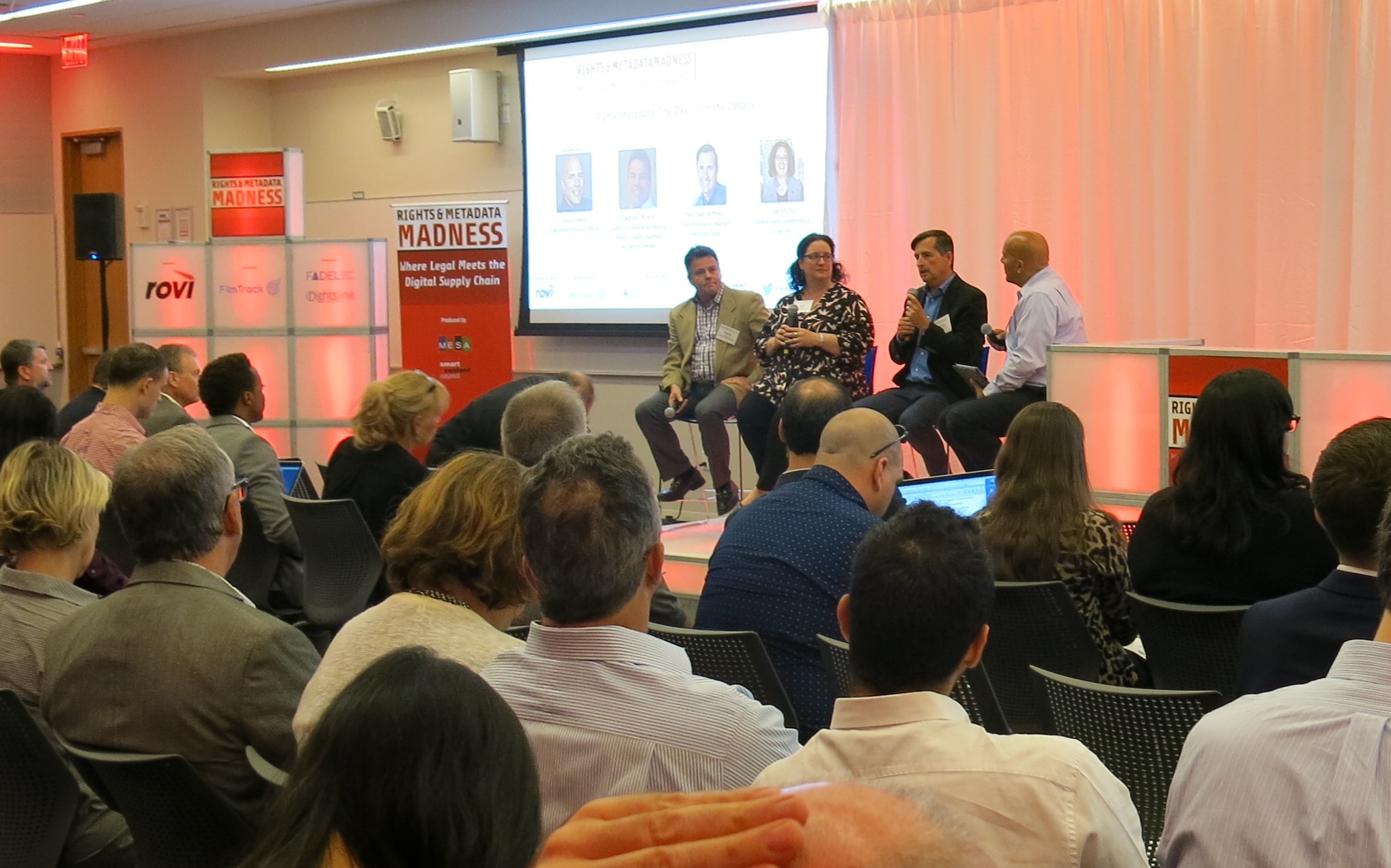Exclusives

Challenges Abound for Metadata Collectors
Story Highlights
NEW YORK — Collecting metadata is essential for companies who handle content, everything from movies and TV shows to baseball games, but there are still many challenges when it comes to collecting that information. Especially when it comes to sharing metadata.
That was the takeaway from the Rights & Metadata Madness conference panel “Rights Metadata: The Devil in the Details” July 20, which featured executives from MLBAM, Rovi and Viacom.
A feature-length movie with a sports theme and containing content that includes music from other properties can have assets from 20-50 separate entities, said Michael Jeffrey, VP of market solutions at Rovi. And each of those entities can have restrictions on what the maker of that movie can show, he said, adding that it’s possible you can’t show any beer cans or can’t use an actor in any promotions.
“The metadata around what can and can’t be shared are quite complicated,” he said, adding: “I don’t think as an industry we’re there. I think we’re all struggling with that one.”
“One of the challenges on the rights side is there’s a tendency for a lot of rights holders” to ask what rights they’re “comfortable sharing broadly,” he said. Rights holders may instead want “interested parties that want my assets to come to me, submit a request and they know what they’re looking for, and then I’ll tell them what it’ll cost” for those rights, he said.
A major challenge for a sports league like MLB is the huge amount of data that’s collected during every second of a game, according to Padraic Boyle, director of enterprise media for MLBAM.

Data is constantly coming in from the 30 MLB ballparks in the U.S. and Canada while a game is being played, he said. In addition to broadcasts of the games, bloggers watching the game live add content, he said.
Sarah Nix, director of global data governance at Viacom, provided a detailed account of the somewhat labyrinthine steps involved with metadata collection at her company. The global data governance division was created about two and a half years ago, she said. There are “many, many systems within Viacom that create information about our content, but they don’t speak to one another, so we needed to sort of normalize that data,” she said. The division started with only two people and that grew to a still relatively small staff of five, she pointed out.
The idea was to look at the systems for collecting metadata and figure out what were the common fields that were going to be most widely used by Viacom across the company rather than the entire industry, she said, adding: “We wanted to fix our internal house first.”

An analysis was conducted of those fields, including its finance database, rights management database and internal programming database.
Viacom also has additional data fields including program descriptions and unique episode titles that the company doesn’t have to keep track of, but it’s still nice to have that information, she said.
Her team gets initial green-light reports from the production finance teams and then they verify that against the info it gets from the music and media licensing department (a subset of the legal department) to make sure everything is accurate, she explained.
“In case of an acquisition, if we are purchasing something from another company, we do have access to those documents as well and we verify that,” she said. “Anytime there’s a discrepancy, we raise it to an internal executive committee” at the company that is made up of programming, production, legal and finance people to make sure they’re all in agreement before entering that data, she said. The data gets a unique ID and that “gets forwarded to the downstream systems that are listening to us, so that way everybody gets the message at the same time,” she said.
“Right now, we’re doing U.S. domestic and we’re not done,” she said of the metadata collection process. Targeted next is Viacom’s Latin American division, and then its European and Asian divisions, she said. “We’re doing small bites to make it obtainable and realistic as opposed to trying to do it all at the same time,” she said.

Getting everybody to provide all of the massive amounts of metadata attached to content has been a challenge, she conceded.
Production teams were “not excited about having to fill out another submission form … they’re still not. So we try to make it as painless as possible and also show them the value,” she said, adding those people are told that “we’re going to help you with your pain points.”
Nix gave an example of the kind of metadata that somebody at the company might find useful, pointing to a person maybe not being sure what a program’s actual title is because a show has changed titles multiple times throughout the production process. All of those titles are kept track of in the metadata, she said. “Some people are completely on board. Some people are still resistant, but we’re just kind of plowing ahead and getting the executives to kind of make them do it,” she said.
“One of our hopes is … to eventually send the metadata to other systems — external systems — with our VMID (our Viacom Media Identifier) and require those systems to hold it and give it back to us when we want data back — and that’s our kind of current external challenge,” she said.
New technology stands to only make the metadata collection process even more complicated. The panelists discussed virtual reality (VR) specifically.
“We haven’t explored VR at all in terms of what we’re doing,” said Nix. But she said, “our data model is flexible enough that we could, if we needed to,” add a new field for data related to that technology usage.









